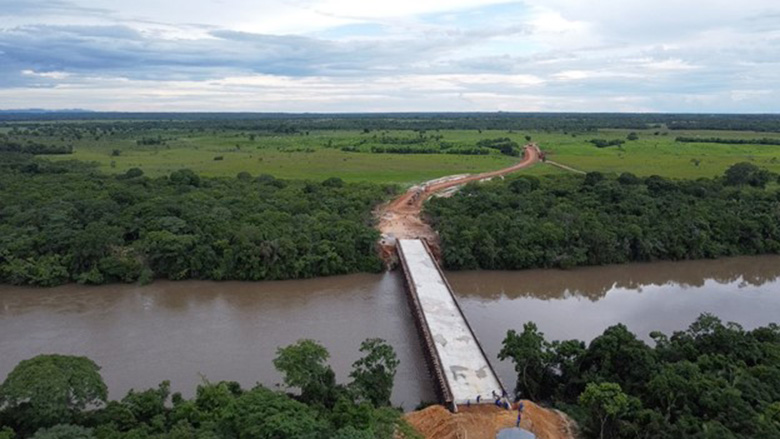Beneficiary Story/Quote
“My grandfather, who lived in these lands all his life, used to say that, since the road was opened in the 1940s, the community dreamed of a bridge to safely cross the Manuel Alves River. Without it, we use a raft ferry. The crossing, which usually takes 40 minutes, can take up to four hours when the water is high. We are grateful for the raft, but we are very proud to finally retire it.”
Mr. Envian de Senna, worker at the Manuel Alves bridge construction site and resident in the local community.
Challenge
Tocantins is one of Brazil’s remotest states geographycally, and, having been formed in 1988, the latest to be established. Its huge territory and sparse population made transport connectivity challenging, particularly in providing all-season access to rural communities and reliable logistics to the state’s thriving agricultural sector. The state’s administration lacked capacity for efficient delivery of public services, such as road asset management, local development promotion and education, which faced quality issues as well as a high drop-out rate. The state struggled with gender-based violence (GBV) alongside major trunk roads, in which heavy freight traffic leads to a prevalence of sexual exploitation of women and girls. Tocantins also needed to ensure better enforcement of environmental regulations, in order to avoid excessive burden on economic activity while ensuring preservation of the Cerrado biome.
Approach
The Tocantins Integrated Sustainable Regional Development Project (PDRIS) was designed to improve road transport and enhance the efficiency of selected public services, with the goal of supporting an integrated and territorially balanced development agenda in the state. This agenda included improving local livelihoods, environmental sustainability, and educational services especially in lagging areas of the state’s territory.
PDRIS was the third World Bank project to focus on rural roads in Tocantins. The project incorporated a multi-sector approach to promote the state’s development. PDRIS supported the rehabilitation of paved and unpaved roads, by mainstreaming the use of performance-based contracts known as CREMA (Contracts for Rehabilitation and Maintenance), which were shown to yield superior performance in road asset management. The roads component also fixed more than 1,600 critical spots with bridges, culverts and drainage works, aiming to ensure year-round accessibility to rural communities in western Tocantins. These works were selected using a participatory approach, in which inputs from communities’ consultations were considered on par with criteria such as traffic volumes.
In a second component, PDRIS supported the institutional development and public services provision in Tocantins, through capacity building, facility modernization, and equipment acquisition. The road improvements also had synergy with other interventions, such as supporting the productivity of small cattle producers, clean-powered irrigation, drone-aided environmental monitoring, community-based tourism development, and the improvement of selected schools, with a special focus on relying on schools’ outreach to mitigate gender-based violence (GBV) along main highways.
